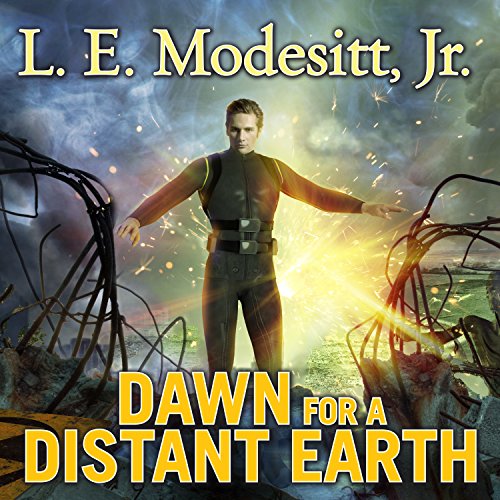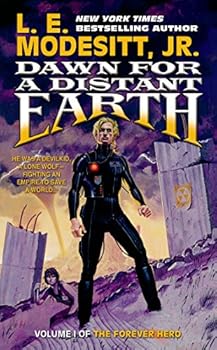
![]() Dawn for a Distant Earth by L.E. Modesitt Jr
Dawn for a Distant Earth by L.E. Modesitt Jr
In the far future, after humanity has spread throughout the galaxy, Old Earth is an abandoned ruin. Nuclear waste and bad environmental policies have killed the ecology and changed the climate. Now Earth is a frozen and desolate wasteland with dangerous sheer winds. Only the toughest people manage to survive in such a harsh climate.
Most of Earth’s sparse population huddles behind the walls of dilapidated shambletowns. Those who don’t have friends and family, or who don’t fit in for some other reason, remain outside. One of these misfits is a nameless “devil kid” who becomes the protagonist of L.E. Modesitt Jr’s FOREVER HERO trilogy after getting captured by the galactic empire. The empire takes him in, sends him to school, and enlists him in their military. Smart, strong, resourceful and unattached, Gerswin makes an excellent soldier. Unfortunately for the empire, though, he just can’t forget about Old Earth. He is obsessed with seeing it healed and restored to its rightful status as humanity’s mother. Fortunately for Gerswin, his strange genes (perhaps mutated by Earth’s toxic environment?) give him exceptionally long life and he just may live long enough to see his dream come true.
I picked up Dawn for a Distant Earth (1987) because it has recently been released in audio format by Tantor Audio and, having read some of his work, I was interested in reading this, one of Modesitt’s earliest novels. Also, climate change and environmental policy are hot political issues these days and I thought it would be interesting to see how Modesitt approached these concerns nearly three decades ago. I was surprised to find that Dawn for a Distant Earth doesn’t feel dated at all. In fact, as we think about climate change, religious war, refugees, and human rights, Dawn for a Distant Earth feels quite current and relevant for today’s audience. I also noticed that about half of Modesitt’s soldiers, officers, and top-level administrators are women, something else that is pleasantly surprising for a novel published in 1987.
 The story is recognizably Modesitt’s, which is a good thing if you are a fan. His hero, who is smarter than everyone else, hides his supernatural skills as he rises up through the military ranks, learning everything he’s supposed to learn while acquiring some extra fighting and technological skills that make him a better soldier than his comrades. Some of his superiors are incompetent idiots while others notice and reward his excellent service. Some of his contemporaries mindlessly follow orders while Gerswin philosophically considers his own, and his government’s, actions. For example, he thinks about the causes of war and compares and contrasts the apparent barbarism of hand-to-hand combat with the ability to coldly dispatch thousands of distant people with the push of a button. He wonders why humans, who have created amazing technology and launched themselves into space, were not able to save their own planet.
The story is recognizably Modesitt’s, which is a good thing if you are a fan. His hero, who is smarter than everyone else, hides his supernatural skills as he rises up through the military ranks, learning everything he’s supposed to learn while acquiring some extra fighting and technological skills that make him a better soldier than his comrades. Some of his superiors are incompetent idiots while others notice and reward his excellent service. Some of his contemporaries mindlessly follow orders while Gerswin philosophically considers his own, and his government’s, actions. For example, he thinks about the causes of war and compares and contrasts the apparent barbarism of hand-to-hand combat with the ability to coldly dispatch thousands of distant people with the push of a button. He wonders why humans, who have created amazing technology and launched themselves into space, were not able to save their own planet.
Several common Modesitt writing patterns are also noticeable, such as the tendency to keep mentioning the two mundane beverage or food items the characters are choosing from, the way all the other characters are awed by the hero and whisper about him as he walks by, the scenes with too many military-style status reports (“Navigation to bridge. All systems green. Course feed complete.” “Stet.” “Engineering to bridge. All systems green.” “Stet.” “Hangar deck to bridge. Transfer complete, and visitors clear.” “Screens dropped for departure?” “That’s affirmative.” “Guns to Captain Black, diversion complete and green.” “Stet.”), the frequent use of onomatopoeia (thud, click, swish, thwop, thunk, whiz, buzz, brrriiinngg, wwwhhheeeee, thrum, hsssst, fssst, crack, beep, ding, crunch, whussshh, boom, rrrrrrrrrrr, etc), and the frequent throat clearing, swallowing, and chuckling that the characters do while talking (and which the narrator usually feels compelled to add to the performance).
Speaking of the audio narration, I listened to Kyle McCarley narrate Tantor Media’s new 13-hour long production of Dawn for a Distant Earth. As I’ve mentioned before with McCarley’s work, he has excellent pace and insight into the characters, but some of his voices, especially for villains and women, are really unpleasant. It’s often difficult for narrators to perform opposite sex roles and McCarley, unfortunately, doesn’t do this well. However, because the narrative focuses almost exclusively on Gerswin, this isn’t too much of a problem in this book.
I love Modesitt’s idea for this story — how a tough nostalgic survivor gets rescued from a destroyed Earth, becomes educated and successful, and plans to go back to restore his homeland. While some of the restoration begins in this first book in the FOREVER HERO trilogy, we don’t actually see much of it happening. We spend more time watching Gerswin acquiring skills and dealing with military life than learning how the Earth is being repaired. I would have enjoyed more emphasis on restoring earth and less on the usual Modesitt military themes. I hope the next book, The Silent Warrior, will be more rewarding in that respect.






I notice in my own writing that I’m too big a fan of, “She cleared her throat.” “He looked down,” “She looked away,” during dialogue as a way of conveying emotion, and trying to veer away from “talking heads.” Because it’s a problem of mine I’m really irritated by it in other people’s work.
It irritates me as well, so hearing a narrator clear their throat or hem and haw, and then read prose indicating that the character did so, would drive me batty.
I love these books…I may have read the whole trilogy a few times. The first book is really fresh and interesting and totally in line with Modesitt’s oft expressed outlook on environmental issues. It follows along with his views from Adiamante as well.